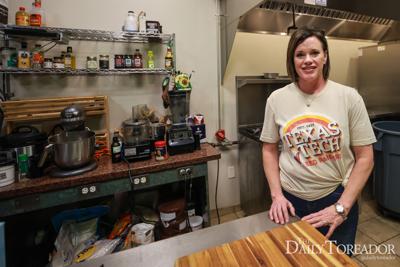For many college students, learning how to make mindful dietary choices away from home can be a difficult task during an already overwhelming time. That’s where Mindy Diller, Texas Tech’s campus dietician, comes in.
Growing up in Wolfforth, Diller was raised by a single mother alongside her three siblings. Her older sister was a Type 1 Diabetic, and healthy options were never hard to find at home.
“Healthy options were on the table every day and not only for the medical conditions, but just overall health and wellness,” Diller said. “We were raised in a time and in a family where we grew a lot of our own produce, and my grandparents had four different kinds of fruit trees and every vegetable you can imagine at some point in our lives.”
Diller said she spent time in nursing and agriculture before pivoting to nutrition. While dietary health had remained a passion of hers, when she arrived at Tech in 2014 as the university’s new campus dietician, she admitted she may not have fully appreciated the scope of the job.
“I don't know that I had any idea of really the vastness of what I would be doing,” Diller said. “I knew it was going to be a big job and holding some reins and trying to build a program and a project here to really incorporate nutrition aspects for all students.”
Now, over a decade later, her daily duties include consultations with students, nutritional writing for informational blogs, giving talks to student organizations and providing input on campus menu changes, although she said every day is different.
Diller said one of her main areas of focus is first-year students. According to a 2008 study conducted by the National Center for Biotechnology Information, freshman weight gain was 5.5 times greater than that of the general population, while finding that the “Freshman 15” was closer to 2.7 pounds on average.
“We know that nutrition and sleep get put on the back burner, so for our freshmen those first few months, even that first semester, you know, they've got their head down and they're swimming through it,” Diller said. “I mean, they just have to keep moving, right? And knowing that nutrition and even movement and sleep are put on the back burner because the other things take precedence, trying to find some small level of balance there.”
While Diller said there is not one blanket recommendation she can give to first-year students, she said finding balance and doing what they can, when they can is the key.
“We’re all different, we’re so diverse,” Diller said. “We have to figure out how to meet people where they are … . What does that look like? Are you having a balance of carbs, protein and veggie or fruit? So sometimes it's just picking two or three things.”
When eating on campus, Smart Choices labels on menus indicate a low-calorie, nutritional choice. Diller said some of her favorite on-campus dining concepts include Second to Naan at The Commons, The Carvery at The Market and The Fresh Plate at Wall/Gates.
“I enjoy The Fresh Plate because there's something for everyone,” Diller said. “So, I highly recommend that for our food allergies, for our body builders, people that maybe like bigger, heartier meals, or is just standard three meals a day. And what a great affordable price there as well. And it's so diverse so you can get all kinds of things.”
For students living off-campus for the first time, cooking meals at home may be a daunting task. Diller’s advice: stick to the basics.
“One, mastering a couple of things,” Diller said. “Maybe that's boiling eggs, scrambling eggs, maybe that's baking chicken, maybe that's adding things to ramen, like diced chicken, peas and carrots or a boiled egg. It can be that easy. Simple equipment, simple ingredients, affordable things out of the freezer and even some canned goods.”
Two food groups Diller said college students often neglect are fruits and vegetables. According to Harvard Health, adults should consume five servings of fruits and vegetables a day. Less than four percent of college students follow this recommendation daily, according to a report by the American College Health Association.
Over the years, nutrition and dietary health have often been associated with rigid, unbending diets often based on shaky research. Diller said she is not a fan of this train of thought, instead encouraging an alternative option.
“I'm more of a balance promoter,” Diller said. “Just because ‘diet’ is scary to a lot of people.”
However, there is one exception to this rule: the trendy Mediterranean Diet. The diet is inspired by the culinary traditions of Southern Europe, which means plenty of fruits, vegetables, whole grains, olive oil and fish while largely leaving out red meat, according to the Cleveland Clinic.
“I do lean on the Mediterranean because it's just such a beautiful balance of fruits and vegetables,” Diller said. “You know, important carbohydrates and more complex carbohydrates from fruits and vegetables, select vegetables and some of those starches. From potatoes and rice and things like that.”
Even while advocating for the Mediterranean Diet, Diller still stressed the importance of flexibility.
“Tell me what you enjoy,” Diller said. “‘No fish.’ Okay, so let's focus on lean proteins, complex carbohydrates and fibers like potatoes and rice and whole grains and things like that.”
Diller said finding balance is not only important within a person’s diet, but also within the wider picture of someone’s health.
“I remind students that 100% healthy on campus really has to combine 20% fitness or movement and then 80% nutrition,” Diller said. “Now, that needs to also incorporate mental health and balance and rest and sleep and things like that. And so, I usually address that in the nutrition aspect of that. To be well rounded, we have to have both.”
Looking forward, Diller said her long-term goals include raising nutritional awareness, providing more resources for students and incorporating diverse, healthy options around campus.
“We’re always looking for the newer focused foods that students really like,” Diller said. "So, different ethnic infusions is something that we will look at, and there’s a lot of nutritional opportunity there, and I love that.”
Students can access Tech's nutritional resources and information here.



(0) comments
Welcome to the discussion.
Log In
Keep it Clean. Please avoid obscene, vulgar, lewd, racist or sexually-oriented language.
PLEASE TURN OFF YOUR CAPS LOCK.
Don't Threaten. Threats of harming another person will not be tolerated.
Be Truthful. Don't knowingly lie about anyone or anything.
Be Nice. No racism, sexism or any sort of -ism that is degrading to another person.
Be Proactive. Use the 'Report' link on each comment to let us know of abusive posts.
Share with Us. We'd love to hear eyewitness accounts, the history behind an article.